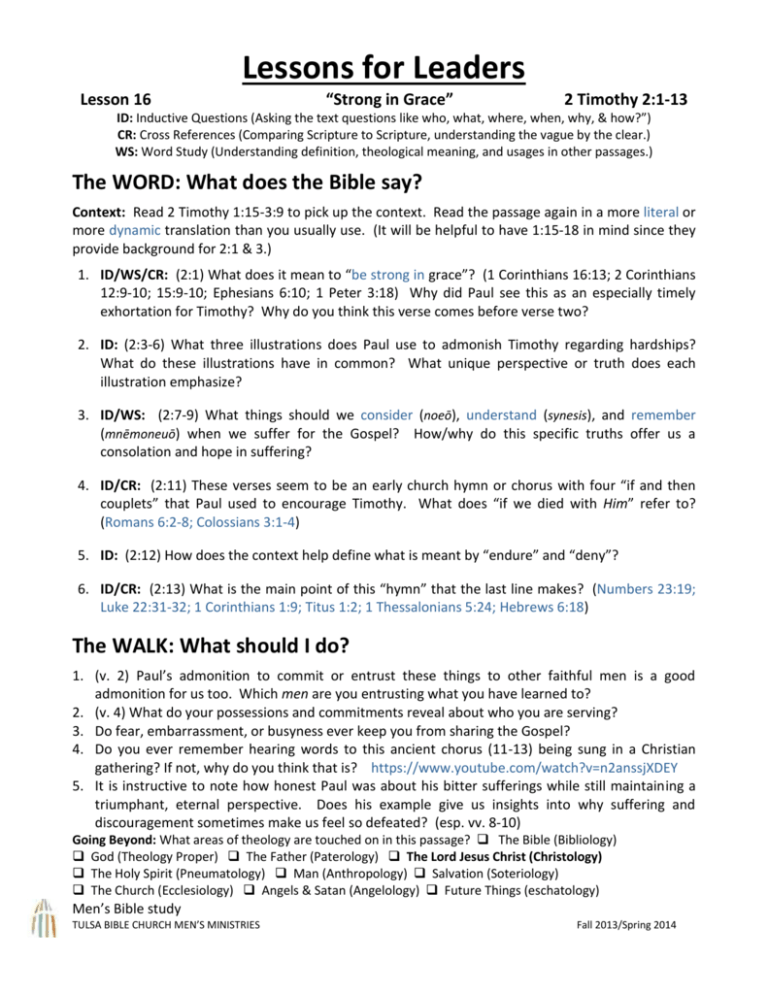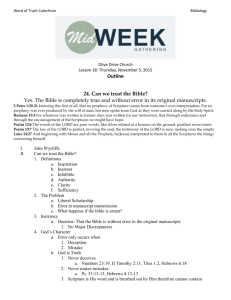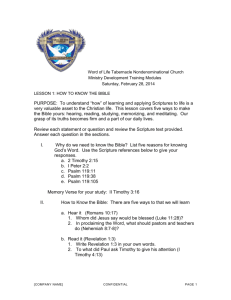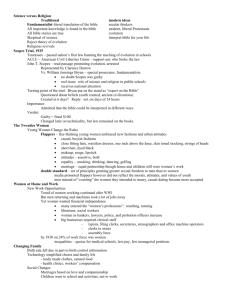DOC - Tulsa Bible Church
advertisement

Lessons for Leaders Lesson 16 “Strong in Grace” 2 Timothy 2:1-13 ID: Inductive Questions (Asking the text questions like who, what, where, when, why, & how?”) CR: Cross References (Comparing Scripture to Scripture, understanding the vague by the clear.) WS: Word Study (Understanding definition, theological meaning, and usages in other passages.) The WORD: What does the Bible say? Context: Read 2 Timothy 1:15-3:9 to pick up the context. Read the passage again in a more literal or more dynamic translation than you usually use. (It will be helpful to have 1:15-18 in mind since they provide background for 2:1 & 3.) 1. ID/WS/CR: (2:1) What does it mean to “be strong in grace”? (1 Corinthians 16:13; 2 Corinthians 12:9-10; 15:9-10; Ephesians 6:10; 1 Peter 3:18) Why did Paul see this as an especially timely exhortation for Timothy? Why do you think this verse comes before verse two? 2. ID: (2:3-6) What three illustrations does Paul use to admonish Timothy regarding hardships? What do these illustrations have in common? What unique perspective or truth does each illustration emphasize? 3. ID/WS: (2:7-9) What things should we consider (noeō), understand (synesis), and remember (mnēmoneuō) when we suffer for the Gospel? How/why do this specific truths offer us a consolation and hope in suffering? 4. ID/CR: (2:11) These verses seem to be an early church hymn or chorus with four “if and then couplets” that Paul used to encourage Timothy. What does “if we died with Him” refer to? (Romans 6:2-8; Colossians 3:1-4) 5. ID: (2:12) How does the context help define what is meant by “endure” and “deny”? 6. ID/CR: (2:13) What is the main point of this “hymn” that the last line makes? (Numbers 23:19; Luke 22:31-32; 1 Corinthians 1:9; Titus 1:2; 1 Thessalonians 5:24; Hebrews 6:18) The WALK: What should I do? 1. (v. 2) Paul’s admonition to commit or entrust these things to other faithful men is a good admonition for us too. Which men are you entrusting what you have learned to? 2. (v. 4) What do your possessions and commitments reveal about who you are serving? 3. Do fear, embarrassment, or busyness ever keep you from sharing the Gospel? 4. Do you ever remember hearing words to this ancient chorus (11-13) being sung in a Christian gathering? If not, why do you think that is? https://www.youtube.com/watch?v=n2anssjXDEY 5. It is instructive to note how honest Paul was about his bitter sufferings while still maintaining a triumphant, eternal perspective. Does his example give us insights into why suffering and discouragement sometimes make us feel so defeated? (esp. vv. 8-10) Going Beyond: What areas of theology are touched on in this passage? The Bible (Bibliology) God (Theology Proper) The Father (Paterology) The Lord Jesus Christ (Christology) The Holy Spirit (Pneumatology) Man (Anthropology) Salvation (Soteriology) The Church (Ecclesiology) Angels & Satan (Angelology) Future Things (eschatology) Men’s Bible study TULSA BIBLE CHURCH MEN’S MINISTRIES Fall 2013/Spring 2014 Lessons for Leaders Explaining Inerrancy: A Commentary on the Chicago Statement on Biblical Inerrancy by Dr. R.C.Sprouls (1980) THE WORD OF GOD AND TRUTH The meaning of “truth” should be self-evident, but this has not been the case where discussions of the truthfulness of the Bible are concerned. What is truth? Some have argued that the Bible is not truthful unless it conforms to modern standards of scientific precision -no round numbers, precise grammar, scientific descriptions of natural phenomena, and so forth. Others have taken an entirely opposite view, arguing that the Bible is truthful so long as it attains its general spiritual ends, regardless of whether it actually makes false statements. Articles XIII through XV thread their way between these extremes. They maintain that the Bible is to be evaluated by its own principles of truth, which do not necessarily include modern forms of scientific expression, but argue at the same time that the statements of Scripture are always without error and, therefore, do not mislead the reader in any way. Article XIV deals with the way apparent discrepancies involving problems not yet resolved should be handled. ARTICLE XIV: CONSISTENCY We affirm the unity and internal consistency of Scripture. We deny that alleged errors and discrepancies that have not yet been resolved vitiate the truth claims of the Bible. Because the Bible is the Word of God and reflects his truthful character, it is important to affirm that it is one. Though it contains much information of a wide diversity of scope and interest, nevertheless there is an internal unity and consistency to the Word of God that flows from the nature of God’s truth. God’s truthfulness brings unity out of diversity. God is not an author of incoherency or of contradiction. His Word is consistent as well as coherent. The denial in Article XIV deals with the particular problems of harmonization between texts that appear to be contradictory and of a number of other alleged errors and discrepancies pointed out repeatedly by critics. It must be acknowledged that there are some as yet unresolved apparent discrepancies in Scripture. A great deal of careful scrutiny has been applied to the investigation of these, and that effort has yielded very positive results. A great many alleged contradictions have been resolved, some in the early church and others more recently. The trend has been in the direction of reducing problems rather than increasing them. New knowledge acquired about the ancient texts and the meaning of language in the biblical age as well as new discoveries coming from manuscripts and parchments uncovered by archaeology have given substantial help in resolving problems and have provided a solid basis for optimism with respect to future resolution of remaining difficulties. Difficulties that have not been resolved may yet be resolved under further scrutiny. This approach to the question of the resolution of difficulties may seem at first glance to be an exercise in “special pleading.” However, if any work deserves special consideration it is sacred Scripture. Before we jump to the conclusion that we are faced with an ultimately unresolvable contradiction we must exhaust all possible illuminating research. A spirit of humility demands that we give careful attention to the resolutions that have already been made, and that we acknowledge that we have not as yet left every stone unturned in our efforts to give a fair and judicious hearing to the text of the Bible. Some of the greatest discoveries that have helped us to understand the Bible have come about because we have been forced to dig more deeply in our efforts to reconcile difficulties within the text. It should not be deemed strange that a volume that included sixty-six different books written over 1400 hundred years would have some difficulties of harmonization within it. It has often been charged that the Bible is full of contradictions. Such statements are unwarranted by the evidence. The amount of seriously difficult passages compared to the total quantity of material found there is very small indeed. It would be injudicious and even foolhardy for us to ignore the truth claims of the Bible simply because of presently unresolved difficulties. We have a parallel here with the presence of anomalies in Men’s Bible study TULSA BIBLE CHURCH MEN’S MINISTRIES Fall 2013/Spring 2014 Lessons for Leaders the scientific world. Anomalies may indeed be so significant that they make it necessary for scientists to rethink their theories about the nature of geology, biology or the like. For the most part, however, when an overwhelming weight of evidence points to the viability of a theory and some anomalies remain that do not seem to fit the theory, it is not the accepted practice in the scientific world to “scrap” the whole well-attested theory because of a few difficulties that have not yet been resolved. With this analogy in science we may be bold to say that when we approach Scripture as we do, we do nothing more or less than apply the scientific method to our research of Scripture Itself. Every student of Scripture must face squarely and with honesty the difficulties that are still unresolved. To do this demands our deepest intellectual endeavors. We should seek to learn from Scripture as we examine the text again and again. The unresolved difficulties, in the process of being resolved, often yield light to us as we gain a deeper understanding of the Word of God. Men’s Bible study TULSA BIBLE CHURCH MEN’S MINISTRIES Fall 2013/Spring 2014









